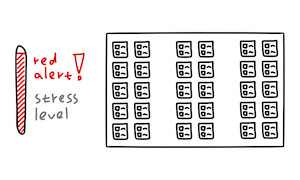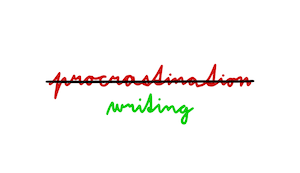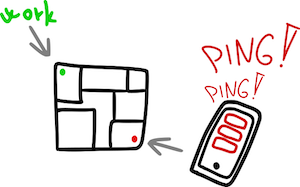How to Focus on Work
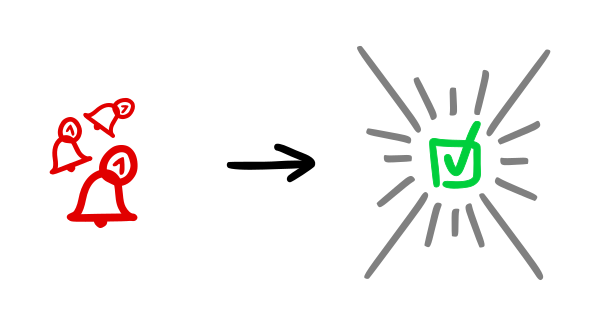
Why can't we focus anymore? Why is it so difficult to focus on work, reading, or studying?
We'll take a look at:
- Why we can't focus anymore
- 2 ways to improve focus
Before we dive into the actionable part, here are some simple reasons why it's harder than ever to focus.
Why we can't focus
Reason #1: we process more information than ever.
According to researchers from the University of California-San Diego, we consume through our phones, laptops, TVs and all other devices about 34 GB of information per day.
The researchers say this leads to an information overload that hampers our focus and leads to constant interruptions that prevent us from reflection and deeper thinking.
Reason #2: filtering out information takes effort.
Contrary to common sense, ignoring things is not a passive mental process.
Researchers have found that it takes energy to ignore irrelevant stimuli.
In the Distracted Mind, neuroscientist Adam Gazzaley writes:
What we learned from this experiment was that the act of ignoring is not a passive process; rather, the goal to ignore something is an active one that is mediated by the top-down suppression of activity below baseline levels of passively viewing.
It's not just about focusing better, but also about ignoring better.
Reason #3: we're being trained like mice by a variable-ratio reward schedule.
Every like on social media, every notification, every email represents something new!!!
We’re being trained to check social media. Whenever we feel a little bit bored, our brain remembers where we could find a bit of fun–on social media.
New is exciting for us. Every such message releases the neuromodulator dopamine in our heads, making us feel good and adventurous.
What if my crush sent me a message?
What if I got that job?
What if a friend wants to meet up and hang?
Unlike in the past, now we carry with us devices that enable us to check if the above is true in about 3 seconds.
How are we then supposed to do work which may require serious mental effort when we have dopamine-candy within our reach almost 24/7?
We process more information than ever, so filtering out the noise takes a lot of effort, and we're constantly being led astray from focus by dopamine-loaded interruptions. No wonder we can't focus.
How to improve focus
It makes sense to divide focus into 2 parts:
- Improving noise ignoring
- Improving concentration
Ignoring irrelevant stimuli (auditory information, visual information,...) is not a passive process. It takes effort.
Logically, the first step should be to minimize the amount of things you need to ignore. Less energy spent on ignoring → more energy for focusing.
Let's get into it.
Reduce distractions beforehand, focus easier
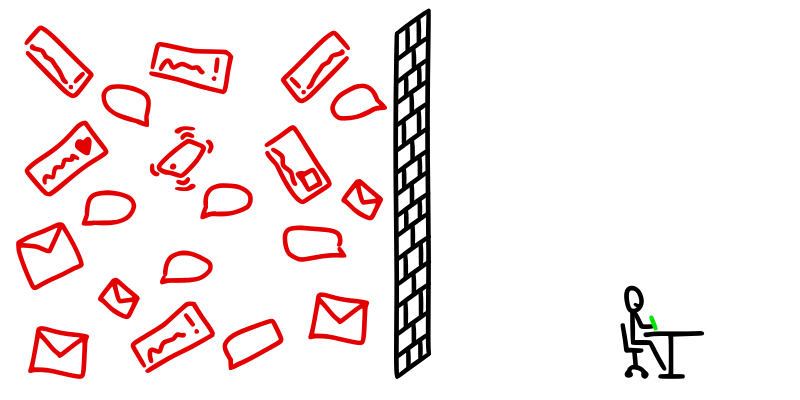
Minimize the effort required to ignore irrelevant stimuli. Either remove them if you can, or use something to make it easier to block out the noise.
Minimize distractions before a work session.
Now we'll divide potential distractions into 2 buckets: auditory and visual.
Minimize auditory noise
Loud notifications, noises from the street, dishwasher sounds,... they can all be distracting. We're wired to notice changes in our surroundings, especially loud ones.
The worst offender in this regard are loud notifications. They are designed to catch your attention. Don't let them.
Silence all notifications
You don't need to get a notification when someone likes your photo or messages you.
You can answer after your work session is done.
If your boss expects you to respond in minutes, fine, leave sound on for that 1 app, but silence all else.
If you want to eventually notice that someone messaged you, you can turn off just the sound and leave the notification visual.
Find a quiet place to work
Another enemy can be ambient noise. Random sounds can be disruptive to our focus.
Here's the obvious thing to do: find a quiet place to work.
It could be a specific room, it could be a place like a public library. It could also mean going to a park with a notebook and a pen, weather permitting.
If you live in a city, then perhaps quiet is really hard to find. From neighbors shouting to car horns blaring, there's a lot of noise.
What to do then?
Use noise-canceling headphones
In this case, here's our recommendation: put on noise-canceling headphones.
This is taking the ignore the noise literally. Background noises can disrupt our attention (especially true for people with ADD/ADHD). If you can't hear them, you don't need to take the effort to filter them out.
Find a good playlist, put on your headphones, and work away.
Minimize visual noise
Visual noise is often ignored. What do we mean by that? Anything visible in your surroundings and not related to what you want to work on. Visible icons for apps, open tabs in the browser, irrelevant items (outdated to-do lists, used dishes,...)
Everything our eyes spot is a possible distraction. You see a notification about a new email, you tap it, and there goes your focus.
Let's deal with common sources of visual noise: your phone, your browser, and your desk.
Hide your phone out of sight, reach, and hearing
The phone is a distraction machine. Sure, we can use it productively, but when it's sitting on our desks during work, it's a constant reminder that we could be doing something fun instead.
Use the Rule of 3 Senses: hide your phone out of sight, reach, and hearing. Put your phone where you can't see, reach it, or hear it. A drawer or a backpack both work.
Do this simple thing, and you'll already be ahead of most people.
If you want some more tips for phone distractions specifically, here's an in-depth article for you.
Turn your browser into a productive environment
The browser is another frequent source of distractions. It was not designed for focused work, it was designed to browse.
If you want to focus better, block distracting sites.
You can use our extension for Chrome and Firefox or some other extension (1Focus for Safari) that performs the same function - blocking distracting sites in your browser.
When you don't have the option of opening a new YouTube tab and going down a rabbit hole, you can focus better.
It's not about imposing draconian limits on yourself and blocking every remotely fun website forever. It's about setting deliberate limits so that you spend your time in a way that you won't regret.
Reduce physical and digital clutter
Look around you.
Do you see untidy piles of clothes? Used dishes? Long to-do lists and tons of post-it notes with things you meant to do?
That's not good for your mood or productivity. Our surroundings influence our mood.
Declutter.
If you have 50 post-its with ideas and to-do lists in sight, it'll take more effort to not glance at them. Remove them.
Same goes for 25 open browser tabs. Close them. 10 open apps? Close. Work folder a mess? Organize it at the end of your work day today.
Remove things that could prevent you from focusing or annoy you during a work session.
Train focus like a muscle
Now that we have less noise to ignore, how to boost your ability to focus?
Before we get into the tips and tricks, remember this: our brain optimizes what we do often.
In other words, if we do something 20x a day, we're telling our brain "hey, this is probably important, optimize this so that it doesn't take conscious effort."
Unfortunately, many of us train getting distracted. Every time we tap an icon or open a new tab, we're reinforcing the neural circuits related to getting easily distracted.
Fortunately, the same principle applies to doing focused work as well. The more often you focus, the better you'll be at it.
Every time you sit down and do the work without letting yourself get side-tracked, you will reinforce the right neural circuits that will make it a bit easier next time.
Every day, pick 1 activity and do it with your full attention. Stop switching. Single-task. Focus on 1 thing. If you can't do an hour, do 30 minutes. If you can't do 30 minutes, do 15. Start training yourself to focus.
So, the first way you can make focusing easier is to focus more often.
This is a process. However, there are some other tactics that can help you immediately.
Use a Pomodoro-like timer
You've heard this one before. Nevertheless, it's helpful, especially for repetitive work.
It's easier to make the effort focus when you know that you'll be done in 25 minutes and then have a break. Techniques like Pomodoro combine periods of focus and rest to help you tap into a more natural productivity rhythm.
For longer tasks, the interval could be different. According to the time tracking app DeskTime, the top performers work on average 52 minutes and then take a 17 minute break. Naturally, if you install our extension, you can turn on a pre-configured timer with a couple clicks.
Do concentration exercises
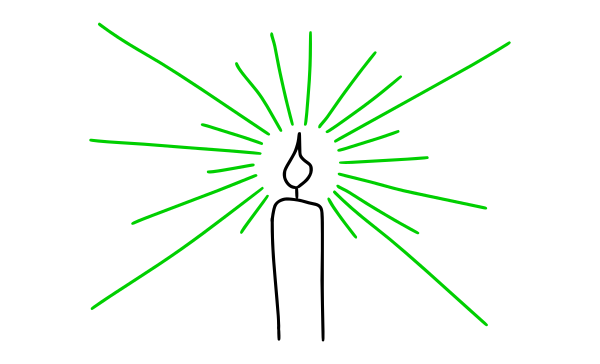 You've probably also heard of meditation by now.
You've probably also heard of meditation by now.
Simply focusing on your breath for 10-20 minutes a day can significantly hone your ability to focus. Apps like Oak, Calm, or Headspace can help you get into the habit.
Besides the well known types of meditation, one specific concentration-training exercise you can try is called trataka. It may seem a bit weird in this day and age, but it works. It just works.
Here's how:
- Light a candle in a dark room and place it so that it's at eye level when you sit.
- Stare at the unmoving flame for as long as you can, without blinking. (When your thoughts wander, re-focus on the flame.)
- Once your eyes start burning, close them and focus on the candle flame's afterimage in your mind.
- When the afterimage fades from your mind, open your eyes and focus on the flame again.
Repeat for 10-15 minutes, for 2-3 weeks. This exercise will train you to focus like very few other things can.
Regardless of the type of meditation you practice, you'll learn to control your attention better and redirect it back to the task at hand.
Go for a walk in nature beforehand (if you can)
Finally, one last tip that might or might not be applicable to you.
Researchers found that at least 20 minutes of walking outside in a park or the woods significantly lowered participant's stress levels and enhanced their performance on a cognitively demanding test afterwards by about 20 %.
Feeling unfocused? Got a park nearby? Go for a walk.
Focus: Environment and skill
The first part on eliminating distractions beforehand is more about creating the right environment for work.
The better you set up your environment to block out noise of all kinds, the easier it'll be to focus.
The second part is about the skill of focusing, training and boosting your ability to focus.
The more often you focus, the easier it'll be to get into the right state of mind.
Both play a role.
Set up your environment to help you focus, and then practice focus for as long as you can. Over time, your ability will improve and you'll focus more easily and for longer.
Summary: How to Focus on Work
Minimize distractions before a work session.
Minimize auditory noise:
- Silence all notifications.
- Find a quiet place to work.
- Use noise-canceling headphones.
Minimize visual noise:
- Use the Rule of 3 Senses: Put your phone out of sight, reach, and hearing (Do Not Disturb mode).
- Block distractions in the browser. Note: you can use our extension to do this or other solutions available.
- Reduce physical and digital clutter.
Train focus like a muscle. The more you do it, the better you'll be at it.
Here are some ways to boost focus:
- Use a Pomodoro timer.
- Do concentration exercises (like meditation or trataka).
- Go for a walk in nature beforehand.
You don't need to do all of the above. Pick a couple and apply them today to get the benefits.
Use this framework to focus on signal in a world full of noise.

